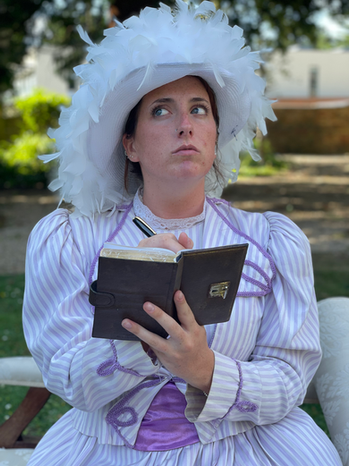
The Tethered Wits Academy presents the timeless tale of identity, wit and cucumber sandwiches: 'The Importance of Being Earnest'.
Upper class bachelors, the well-meaning John Worthing and playboy Algernon Moncrieff, create different identities for themselves to pursue two wonderfully eligible ladies, Cecily Cardew and Gwendolyn Fairfax. However, their identity misadventures lead to twists and turns in their tumultuous romantic journeys, all under the watchful eye of the inimitable Lady Bracknell.
Oscar Wilde’s legendary satirical comedy is a modern classic, dazzlingly brought to life in a stunning open-air setting.
CAST (In Order of Appearance)
Lane, Merriman………………………………Samuel Crawford
Algernon Moncrieff………………………….Charlie Harris
John Worthing, JP…………………………….Ethan Bareham
Lady Bracknell………………………………….Beth Ellison
Hon Gwendolen Fairfax……………………Alexa Ellison
Miss Prism…………………………………………Martha Sharp
Cecily Cardew…………………………………….Antonia Billington
Rev Canon Chasuble, DD…………………..James Carder-Geddes
CREW
Directors………………………………………………Ethan Bareham & Beth Ellison
Costume, Props and Set..........................Eleanor Dickens
Stage Manager.............................................Amaal Fawzi
Director of The Academy Programme................Amy Porter
Directors of Tethered Wits........................Amy Porter & Gabriella Sills
With a special thanks to.............................Dean Close School, The OD Society, Alexander Hume
THE IMPORTANCE OF BEING EARNEST
First performed on Valentine’s Day, 1895, ‘The Importance of Being Earnest’ has captivated audiences for over a century with its sharp wit, satirical edge, and delightful absurdity. The play premiered at the St James’s Theatre to a successful opening night that would mark the climax of Wilde's career but also herald his downfall. The Marquess of Queensberry, whose son Lord Alfred “Bosie” Douglas was Wilde's lover, planned to present the writer with a bouquet of rotten vegetables and disrupt the show. Wilde was tipped off, and Queensberry was refused admission, but their feud came to a climax in court in April 1895 when Wilde sued for libel. However, the proceedings provided enough evidence for Wilde’s arrest, trial, and conviction on charges of 'gross indecency'. After his release from prison, Wilde published the play from exile in Paris, but wrote no more comic or dramatic works after that.
The story revolves around two bachelors, John “Jack” Worthing and Algernon “Algy” Moncrieff, who create fictitious personas to escape their burdensome social obligations. Jack invents a wayward brother named Ernest whom he uses as an excuse to leave his country estate and enjoy the pleasures of London. Algy adopts the persona of Ernest to court Jack’s ward, Cecily. Chaos ensues when the characters' deceptions are discovered, leading to a series of comedic misunderstandings and revelations.
Earnest is unique because the play’s only ironist is Wilde himself, deliberately sacrificing the illusionistic conventions of naturalism to show just how comic human life is. In short, Wilde is revealing himself, his ostentatious personality and wit, more discernibly to share his fun with the audience. But Wilde also wants the audience to treat this fun with the utmost of respect and sincerity. Earnest merits attention both as satire and as drama. Tone and plot have been perfectly integrated, and the whole is more truly comic as a result. The play’s central premise revolves around deceit and duplicity but is really about the superficial nature of the self and how we present ourselves to a society preoccupied with appearances.
For example, note when Algernon explains his reluctance to dine with Lady Bracknell: “She will place me next to Mary Farquhar, who always flirts with her own husband across the dinner table […] The amount of women in London who flirt with their own husbands is perfectly scandalous. It is simply washing one's clean linen in public”. He is shocked at convention. And his tone implies that he is elevating break of convention into a moral norm. What Wilde and his satirical ancestors all have in common is that they derive their ideals for conduct from the actual practice of their societies. They are the literal-minded victims of their environments, realists with a vengeance, who hide in plain sight. On the opening night of the play in 1895, Wilde wore a green carnation. Algernon describes his moments of freedom from the constraints of social expectation as “bun-burying”. Wilde wants the satire and the fun that satire produces to be as earnest as possible. People seem ashamed to label something a ‘farce’ nowadays, but the play’s merit is that it is all farce, capable of serving as a lucid image of our non-farcical reality, affording us the opportunity to laugh at it with sincerity. With Earnest-ness.
Ethan Bareham
Director of 'The Importance of Being Earnest'
THANK YOU
Thank you so much for coming to our production of 'The Importance of Being Earnest'. We are so grateful to you, our wonderful audiences, for your continued support.
For more information on our other shows 'Jeeves and Wooster' and 'The Railway Children', please do explore our website 'tetheredwits.com' and on all forms of social media '@tetheredwits'
Stay in touch: Join our mailing list by visiting: tetheredwits.com/mailing-list




























